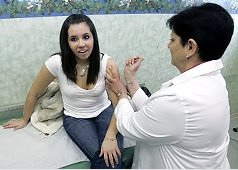New Gardasil cervical cancer vaccination requirement for immigrants stirs controversy

New York, NY
There's no question that it's a hot shot.
Gardasil, the first anti-cancer vaccine ever to come on the market in the U.S., has evoked strong pro and con reactions among parents and some doctors ever since its 2006 FDA approval. It doesn't look like the controversy surrounding it is going to stop any time soon.
Not everyone's happy over the federal requirement that all new female immigrants ages 11 to 26 receive the vaccine, which protects against cervical cancer. The new requirement, which went into effect August 1, will affect more than 130,000 immigrants a year. Cervical cancer causes about 4,000 deaths annually.
The vaccine is expensive, costing several hundred dollars for the required three doses. So far, about a quarter of U.S. teens (about 2.5 million girls) have been given at least one of the three shot series in Gardasil's first full year of distribution, according to the Centers for Disease Control.
Now, immigrants will be required to receive a vaccine that's not even required in this country.
"This is one of the most heartwarming democratic processes I've ever seen," says Dr. William Schaffner, professor and chair of the department of preventive medicine at Vanderbilt University and a member of the CDC's Advisory Committee on Immunization Practices. "Through an interesting quirk, now all these immigrant girls and young women will be protected against cancer. Immigrants will be better protected against cancer than our own population."
The high cost of the vaccine has some medical providers wondering where the funding will come from to administer it.
MORE HEALTH NEWS: FOOD ALLERGIES ON THE RISE FOR U.S. CHILDREN
"If the immigrant has to pay for it, this would be a real burden," says Dr. Jessica Sessions of the Ryan Community Health Center on the Upper West Side, which serves about 40,000 patients per year, many of them low income. "It is a great vaccine but it is extremely expensive for people without insurance."
Gardasil blocks four strains of HPV, two of which cause about 70 percent of cervical cancers. The CDC recommends the vaccine for girls as young as age 11, with catch-up shots up to age 26. It is most effective when given early, before a girl becomes sexually active and might already have contracted the virus that the vaccine blocks – the human papillomavirus, or HPV.
Most medical organizations echo the CDC's advice that Gardasil be part of routine vaccinations, but there have been some concerns about the vaccine's potential side effects. As of June 30, the FDA had received nearly 10,000 reports of adverse reactions following Gardasil injections. Most of the reports described pain at the injection site, fainting, fever and headaches.
Some parents have been reluctant to give their daughters the vaccine because they feel it encourages premarital sex. Dr. Rebecca Booth, a gynecologist and author of "The Venus Week: Discover the Powerful Secret of Your Cycle at Any Age," has administered thousands of Gardasil injections with no serious side effects. She says that exposure to the virus Gardasil protects against is always a matter of personal choice.
"A patient of mine contracted cervical cancer when she was raped," Booth says. "Women who are sexually assaulted can be exposed to the virus. There is a lot of expense, grief, pain and suffering due not just to cervical cancer, but to the precancerous lesions that HPV also causes."
Dr. Schaffner, who calls the vaccine "an extraordinary advance in women's health and the first explicit anti-cancer vaccine," believes that when Gardasil is assessed by the CDC a couple of years out, the findings will be disturbing.
"There will be a disparity in use by income and, as a consequence, by racial and ethnic background," Schaffner says. "More affluent, educated parents will have higher rates of vaccinating their children than parents of more modest means. Will we as a society be satisfied with those kinds of disparities?
"Is it appropriate, in the U.S. in the 21st century, to have substantial portions of its population at risk for cancer of the cervix when we have a vaccine that is safe and effective against 70 percent of all cervical cancer?"
Labels: Cervical Cancer Prevention, Cervical Cancer Vaccine, Gardasil

0 Comments:
Post a Comment
<< Home